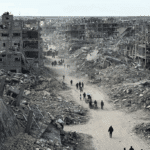Brussels/The Hague, 10 February 2014 – As the International Criminal Court (ICC) begins its evaluation of the charges against Congolese warlord Bosco Ntaganda today, Avocats Sans Frontières (ASF) reiterates that the safety of the 922 victims taking part in the procedure is paramount. Dubbed “The Terminator”, Bosco Ntaganda is accused of committing numerous human rights’ violations in eastern DR Congo, including the recruitment of child soldiers and the use of rape as a weapon of war. In this case, which is highly symbolic of the fight against impunity, ASF gathered and transferred the majority of victims’ testimonies to the ICC.
The hearing to confirm the charges against Bosco Ntaganda, who handed himself over to the Court on 18 March 2013, will begin today in The Hague (Netherlands). A senior military chief, Ntaganda is accused of 18 counts of war crimes and crimes against humanity, which resulted in tens of thousands of victims.
Some of these victims will be permitted to participate in the hearing through their lawyers. “This is an important stage in the process, as the victims obviously have high expectations. Not only do they hope their voices will be heard, but in particular, they are expecting compensation for the crimes they endured”, says Luc Meissner, ASF’s international criminal justice project co-ordinator. “This hope is all the stronger for the approximately 100 child soldiers, the majority of whom are victims of serious violations committed by Thomas Lubanga, a warlord convicted by the ICC in 2012. They are still waiting for a decision on the compensation to which they are entitled”.
While ASF is satisfied that victims are to participate in proceedings, the NGO insists that their safety must be fully guaranteed and their testimony kept confidential. “The victims must be kept informed of developments at the hearing. Yet, despite the surrender of the M23 movement, the situation in eastern DR Congo is still volatile. This means that access to victims – all of whom live in conflict zones and in the Ituri region in particular – remains precarious”, states Luc Meissner.
ASF teams have been active on the ground as well as at ICC level since 2002, and have worked towards the participation of victims in this case. In Ituri, ASF and its local partners have gathered evidence from victims and have facilitated contact with the ICC.
“Given the extent of the power and influence exercised by Bosco Ntaganda in the region, this case is an important step in the fight against the impunity of those who perpetrate extremely serious human rights violations. For this reason, the safety of victims and witnesses – as well as the outcome of the trial itself – are crucial to building populations’ confidence in the justice system. We will remain vigilant with regard to the effects on the ground of the handling of this case at the ICC”, adds Luc Meissner
Mr Bosco Ntaganda during his initial appearance before the International Criminal Court on 26 March 2013 © ICC-CPI



